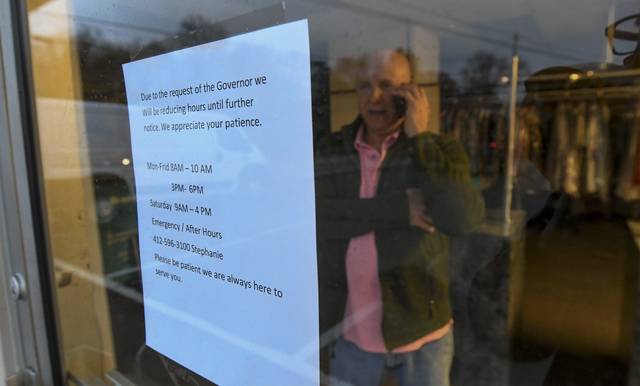There is no business that isn’t life-sustaining. Every business in Pittsburgh, and Greensburg, and the Alle-Kiski Valley, in Pennsylvania and beyond. They all sustain life.
Maybe they don’t all serve the food that fuels a body, but they provide the paychecks that put food on the table.
And so it is alarming to have Gov. Tom Wolf come out late Thursday afternoon and say all those businesses that are still open — finding ways to keep body and soul and sanity together as the coronavirus pandemic swirls — had just a few short hours to close their doors until further notice.
We understand that social distancing is critical in throwing barriers in the transmission of the deadly disease. We know why more and more gatherings of people and places where those people meet have closed day by day for weeks.
But this directive does nothing less than kill the Pennsylvania economy. By mandating the closure of countless businesses, it directly threatens the livelihoods of thousands of people — the small businesses that are the backbone of the state, the mom-and-pop stores just barely hanging on as it is.
And it puts Pennsylvania at huge disadvantage with nearby states that have not imposed such draconian rules.
Wolf’s administration has not handled this with the steady hand that inspires confidence. Instead it has been a bounce that leapfrogs from decision to decision faster than people — or businesses — can adjust.
We have already taken issue with the way the state closed schools just hours after a meeting with superintendents that left districts making their own plans at the Department of Education’s direction. This move with businesses shows the same last minute jump that leaves others to scramble.
There has been a lot of broad interpretation of his previous edict that nonessential businesses should close. His attempt to make a decision and not make a decision at the same time begged for that kind of response. Faced with rent and payroll and all of the other big and small bills that go into keeping the doors open, who is going to say their business isn’t essential?
His new statement shows that little has been learned from the loopholes he left last time. Department stores should close but not general merchandise stores. What is the difference, and can’t one claim to be the other?
“Traveler accommodation” was on the list of closures. Sounds like a hotel. Why not say so and clear up the confusion? Turns out that they can remain open. Imagine the panic of families visiting hospitals. Were they supposed to stay in the waiting rooms instead of a hotel room, and if so, doesn’t that seem more likely to spread disease?
But maybe they aren’t supposed to come at all. Are the borders the next thing to close unexpectedly at dinnertime, governor?
Leaders make hard decisions, and they aren’t always popular, especially in times of crisis. But they should be easy to understand and easy to implement.
The fight against the spread of the coronavirus is supposed to save lives. When the measures go too far, they create economic pain that can also be dangerous to health — and people lose faith in their leaders.








